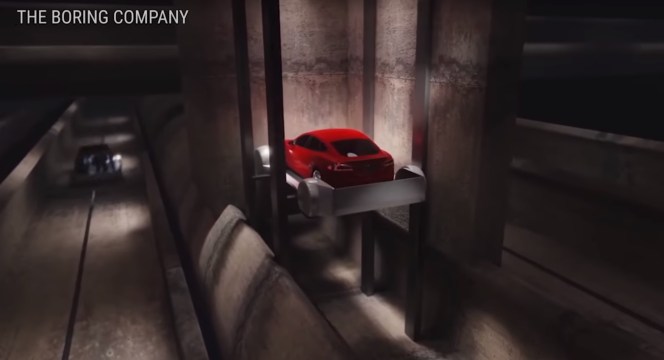Elon Musk's 'The Boring Company' is planning a test tunnel that would be incompatible with Metro's planned Westside rail. Instead of working with Metro, the city of L.A., led by Councilmember Paul Koretz, is pushing to fast-track the Boring project by exempting the test tunnel from public review.
Musk's Boring Co is planning to construct networks of underground tunnels to move people around on high-tech platforms they are calling "skates." Initially, about a year ago, the concept was that these skates would move cars around. A few months ago, Boring's tunnel concept was revised to also include pedestrians. The company released a conceptual map (see below) of a potential L.A. area tunnel network extending from Sherman Oaks to DTLA to Long Beach.
A lot of folks, including this Streetsblog editor, have expressed skepticism about the Musk's tunnel network solving L.A. transportation issues.
The Boring Company is moving forward with plans for a 2.7-mile proof-of-concept tunnel. The Boring Company tunnel would extend underneath Sepulveda Boulevard from Pico Boulevard in West L.A. to Washington Boulevard in Culver City. The tunnel would go under the elevated Metro Expo Line at the Expo/Sepulveda Station and under the Sepuveda Channel creek in Mar Vista.
The city of Los Angeles appears to be fairly eager to support the tunnel. Urbanized reports that last month the city's Board of Building and Safety Commissioners signed off on the proof-of-concept tunnel. At a meeting this Wednesday, the city council's Public Works committee will consider a Koretz motion (council file 17-1342-S1) that would declare the tunnel project categorically exempt from environmental studies under the California Environmental Quality Act (CEQA).
The full, year-plus-long CEQA study process can be bypassed under a regulation called the Class 32 Urban Infill Exemption, which is for small projects in existing urban areas. Specifically, projects must be under five acres to apply for this exemption. The 2.7-mile distance gets the tunnel in just under the five-acre threshold.
In 2017, The Boring Co concept map showed a 6.5-mile proof-of-concept tunnel extending from Westwood to near Inglewood. The 6.5-mile distance was reported widely in late 2017. With a 14-foot wide tunnel extending 2.7 miles, the project footprint (not counting on-ramps, staging areas) would measure 4.58 acres.
For a comparison, take a look at Metro's Regional Connector subway project. The Regional Connector is a 1.9-mile subway under construction in downtown Los Angeles. Metro's Regional Connector project features only two miles of bored-tunnels. That is less tunnel mileage than The Boring Company's proposed proofing tunnel (though Metro's tunnels are 21-feet diameter and Boring's are 14-feet diameter.) Metro did an extensive multi-year full CEQA environmental analysis (plus its concurrent federal equivalent), which was then challenged and upheld in court. Can anyone imagine Metro trying to declare a couple miles of subway tunnels categorically exempt from CEQA?
Speaking of Metro, they too have plans to tunnel underneath Sepulveda Boulevard: arguably Metro's mega-ist mega-project, the Sepulveda Transit Corridor. The $10+billion subway would connect the San Fernando Valley to LAX via rail. Project funding was already approved by voters via both Measure R and Measure M. The most likely alignment: Sepulveda Boulevard. A future Sepulveda rail line would most likely connect with the Metro Expo Line right where Boring Co's proposed proofing tunnel starts.
If The Boring Company gets there first, then Metro's potential alignments become limited. This would likely increase Metro's project costs.
One of the people raising concerns is Juan Matute, a lecturer in Urban Planning at UCLA (and Streetsblog advisor). Matute teaches environmental assessment, including CEQA. He stresses that the Boring Company's current proposal does not meet the requirements for a CEQA exemption, for several reasons.
Matute points out the proof-of-concept tunnel is clearly not a stand-alone project. Plenty of Boring publicity shows that it is part of a broader planned network. CEQA prohibits breaking large projects up into smaller phases to avoid studying the combined impacts of the full project.
In addition, Matute comments that the Boring Company should be applying to Metro, not L.A. City, as its 14-foot tunnels are incompatible with Metro's 21-foot rail tunnels. Per Matute, "Public Utilities Code Section 130051.12(a)(4) grants the Los Angeles County Metropolitan Transportation Authority [Metro] exclusive right to approval of final rail corridor selections." Further, if L.A. City issues Boring Co a tunneling permit it "would violate Metro’s rights to review and approve rail corridors" hence harming transit users by delaying or rerouting the planned Sepulveda Transit Corridor.
What is Metro saying about Boring's test tunnel? So far, officially, the agency has been remarkably silent. It sure looks like the Boring Company is pissing on Metro's fence, and the agency isn't even barking.






